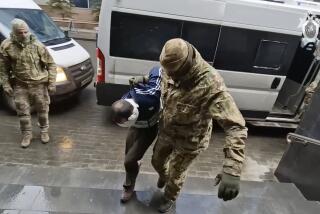Thousands Flee Uzbek Violence
- Share via
MOSCOW — Thousands of people fleeing a bloody crackdown against protests in an eastern Uzbek city gathered Saturday in a nearby border town where rioting erupted amid fears of another assault by government troops.
Police stations, tax offices, the prosecutor’s office and the customs terminal were set ablaze in the town of Korasuv, on the border of Uzbekistan and Kyrgyzstan, the Russian news agency Itar-Tass reported. About 5,000 people had fled there Saturday from Andijon, 30 miles to the west, it said. Hundreds more fled to at least one other border-crossing site.
The violence in Korasuv was apparently triggered, at least in part, by anger that the border had been officially closed. Many residents have relatives on the other side, and some people fleeing Andijon were determined to escape from Uzbekistan.
Uzbek troops and police in Andijon fired into crowds of thousands of protesters Friday, which included armed militants and unarmed civilians. Human rights activists in Andijon put the death toll there at 300 to 500. This morning, a doctor told Associated Press that she had seen about 500 corpses laid out at a school guarded by soldiers.
In the Uzbek capital, Tashkent, President Islam Karimov accused Islamic extremists of staging a revolt and told reporters his troops were forced to open fire on “criminals” who had seized a government building. Karimov said 10 government troops and “many more” militants died, and at least 100 people were wounded in the fighting. He gave no figures on the number of civilians killed.
Karimov denied that his troops shot innocent civilians. “In Uzbekistan, nobody fights against women, children or the elderly,” he said.
Witnesses in Andijon said elderly people, women and children were among the protesters as well as among those killed.
The clashes in Uzbekistan follow the March upheaval in Kyrgyzstan, where protests that started in Osh, across the border from Andijon, led to the ouster of President Askar A. Akayev within weeks.
Many of the frightened people in Korasuv on Saturday were attempting to cross the border, which lies along a small river.
At various sites, hundreds of people succeeded in making it into Kyrgyzstan, while hundreds more who got past Uzbek border guards were stopped on the Kyrgyz side, Itar-Tass reported.
Friday’s clashes in Andijon began shortly after midnight, when armed fighters stormed a prison and released at least 2,000 inmates, including 23 prominent businessmen who were being tried on charges of religious extremism and establishing a criminal organization.
The men, widely viewed as local leaders, had set up a Muslim charity group. They have denied the charges, and anger about their trial triggered the unrest.
Nine people were officially reported killed in Friday’s predawn clashes in Andijon. But most of the deaths occurred in the late afternoon, when troops fired on demonstrators in a city square, stormed the government building held by armed militants and shot at a separate column of about 2,000 protesters, some of whom were carrying weapons.
The United States maintains a military base in Uzbekistan that is used to support its operations in Afghanistan, and the Bush administration considers this Central Asian country of 26 million an important ally. In Washington on Friday, White House spokesman Scott McClellan said, “The people of Uzbekistan want to see a more representative and democratic government, but that should come through peaceful means, not through violence.”
Karimov spoke by telephone Saturday with Russian President Vladimir V. Putin. “Both sides expressed concern about the danger of the destabilization of the situation in the Central Asian region,” the Kremlin news service said.
At the Tashkent news conference, Karimov said that authorities tried to negotiate a peaceful solution in Andijon but protesters had demanded the release of many more prisoners accused of religious extremism.
“To accept their terms would mean that we are setting a precedent that no other country in the world would accept,” he said.
The businessmen freed from prison in Friday’s predawn clash had been charged with membership in Akramia, a group named for Akram Yuldashev, an Islamic dissident from the Andijon region who in 1999 was sentenced to 17 years in prison for allegedly urging the overthrow of Karimov. He has proclaimed his innocence.
Karimov called the Akramia group a “faction of Hizb ut-Tahrir,” an outlawed radical Islamic party that wants to create an Islamic state throughout the Muslim world. The party professes an adherence to nonviolence.
Allison Gill, director of Human Rights Watch’s Tashkent office, said it appeared that the businessmen were in fact followers of Yuldashev but had wanted to have a religious expert testify at their trial that their beliefs were not extremist. Gill also said the violence of the protesters Friday did not prove that Akramia endorsed violence.
“Just because they used force doesn’t imply that their ideology is extremist. It means they’re breaking Uzbekistan’s laws, and we don’t condone that,” she said. “It’s too easy to paint everybody with this Islamic terrorist brush, when it doesn’t seem to be what this group stands for.”
The 23 businessmen may have been selected for prosecution because they formed a charity organization, Gill said, implying that this could be viewed as somehow challenging the government’s authority.
More to Read
Sign up for Essential California
The most important California stories and recommendations in your inbox every morning.
You may occasionally receive promotional content from the Los Angeles Times.










